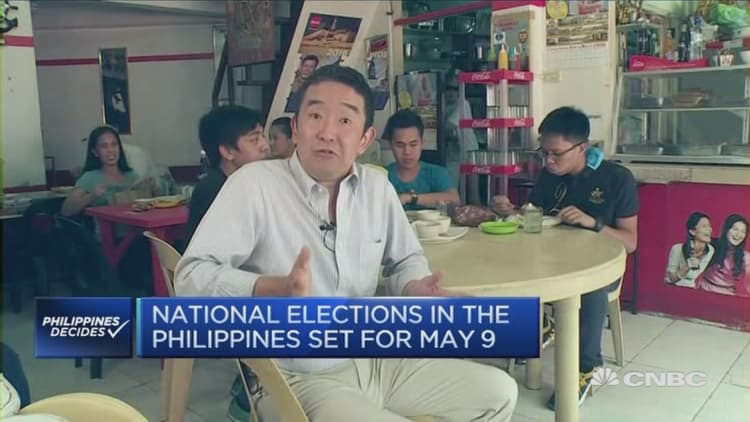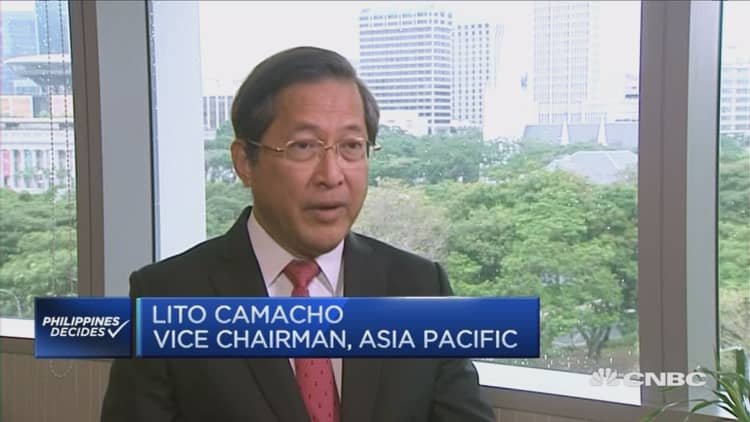


The Philippines, one of Asia's brightest economic spots, heads to the polls on Monday in an election that may hold the key to accelerating the country's development.
The new administration will inherit a country that is in its best shape in decades, one that's evolved from Asia's "sick man" to "strong man." The Philippines recorded gross domestic product (GDP) expansion of 5.8 percent last year, beating out many Southeast Asian peers, including Indonesia, Malaysia, Thailand and Singapore, and the Asian Development Bank is predicting 6 percent growth this year on the back of strong consumption.
Building on that momentum is crucial.
"In many respect, this is the most important political date for the Philippines in years. The president has only one six-year term and President Benigno Aquino's term is up this year. Markets are nervous about his replacement due to the immense potential that the Philippines holds," Natixis senior economist Trinh D. Nguyen said in a note.
The candidates
All four major candidates running this year have campaigned on different platforms, but economists say they share more similarities than differences.
"We find that on paper, there are only nuances, rather than stark differences in their broad underlying ideologies. For example, the common ground amongst most, if not all four candidates, includes creating inclusive growth, building infrastructure, improving health insurance, strengthening the agricultural sector and strengthening law enforcement institutions," Morgan Stanley said in a recent report.
The frontrunner is Davao mayor Rodrigo Duterte, also known as "the Punisher." He's intent on fighting crime and corruption, as well as promoting equal opportunities, especially for low-income earners. Described as "individualistic, eccentric and unconventional" by Joey Cuyegkeng , ING's senior Asia economist, the mayor—a self-proclaimed socialist—is seen as a polarizing candidate for his controversial views towards women, a lack of economic agenda and accusations of illegally acquired wealth.
Political newcomer Senator Grace Poe, the adopted daughter of Philippine film stars, is focused on making the government more sympathetic to people's needs. Some of her key policies include institutionalizing a free lunch program at public schools to combat malnutrition and taking a multilateral, diplomatic approach to the country's maritime dispute with China in the South China Sea, or West Philippine Sea, conflict.
"She is likeable but lacks experience," points out Natixis' Nguyen.
Vice President Jejomar Binay, who resigned from Aquino's cabinet last June, has been focused on business-friendly policies such as improving the country's competitiveness rankings and facilitating government transactions related to business registration. But his campaign has been marred by several graft allegations during his time as mayor of Makati City in the province of Metro Manila.
Manuel "Mar" Roxas II, an ex-interior and transportation secretary and the grandson of former Philippine President Manuel Roxas, is pitching himself as the most trustworthy candidate given his corruption-free record. As a former New York investment banker, he's also won the endorsement of President Aquino.
"Mar Roxas is Aquino's choice but seems unelectable due to his inability to connect with the public," Nguyen noted.
The most recent opinion poll, conducted by Pulse Asia during April 19-24, revealed Duterte holding onto his double-digit lead, with 33 percent of the vote, compared to 34 percent during the last Pulse Asia survey done between April 12-17. In second place was Roxas, with 22 percent support, followed by Grace Po at 21 percent and Binay at 17 percent.
"It is important to recall that one of the key thematic views on the Philippines is that this is an evolutionary, not a revolutionary election. Whoever occupies Malacañang [the country's equivalent of the White House] will continue to walk the policy path well-trodden by [former President] Gloria Arroyo and Aquino," said Eugenia Victorino, ASEAN economist at ANZ.
The to-do list
Poverty reduction and accelerated foreign investment inflows are among the top priorities economists identify for the incoming government.
"Amid an election theme of growing public frustration with ineffective government services, the post-election agenda is likely to be inward-looking, biased towards social spending and people-oriented infra projects addressing these shortfalls," summed up Citi economists in a note.
Creating a clement environment for foreign investors is essential for improving manufacturing exports and employment, said Rajiv Biswas, Asia-Pacific chief economist at IHS. At present, the World Bank ranks the Philippines 103rd out of 189 countries on its 2016 ease of doing business index and while the country has improved under President Aquino, its ranking still lags Southeast Asian peers.
Moreover, with an estimated 25.8 percent of the total population still living below the poverty line, rural poverty is a key public policy challenge, Biswas added.
"These problems have been aggravated by current dry weather conditions due to the El Niño effect, which have resulted in severe drought in parts of the southern Philippines, resulting in food shortages and severe hardship for the rural population in some areas."
Hence, more investment in agricultural infrastructure and irrigation technology, as well as insurance schemes for farmers can help boost rural incomes and mitigate risks associated with extreme weather events, Biswas said.
"Overall, the key to watch is the new administration's ability to carry through with reforms, the speed of implementation and political dynamics and its implications for political tail risks. Our base case is one where the reform agenda continues at a gradual pace following the elections," Morgan Stanley said.



